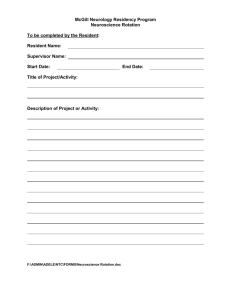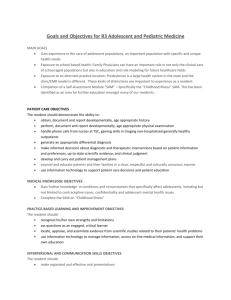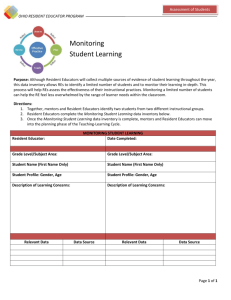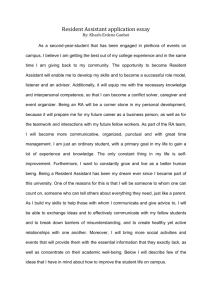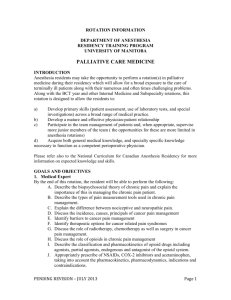Palliative Care - Faculté de médecine
advertisement
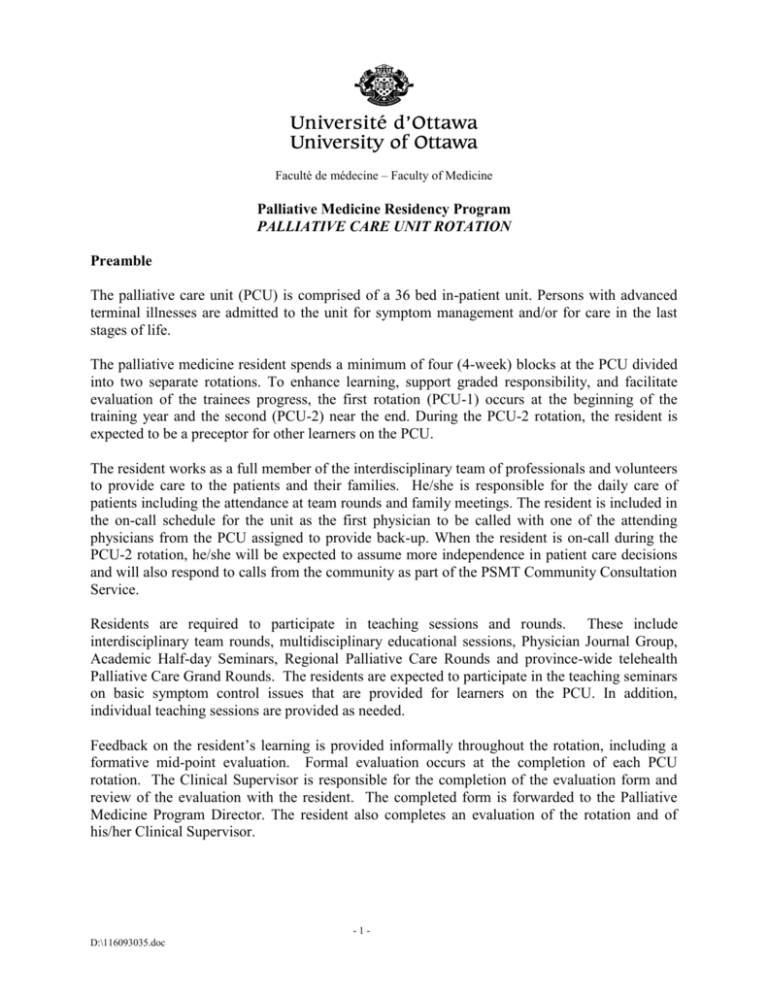
Faculté de médecine – Faculty of Medicine Palliative Medicine Residency Program PALLIATIVE CARE UNIT ROTATION Preamble The palliative care unit (PCU) is comprised of a 36 bed in-patient unit. Persons with advanced terminal illnesses are admitted to the unit for symptom management and/or for care in the last stages of life. The palliative medicine resident spends a minimum of four (4-week) blocks at the PCU divided into two separate rotations. To enhance learning, support graded responsibility, and facilitate evaluation of the trainees progress, the first rotation (PCU-1) occurs at the beginning of the training year and the second (PCU-2) near the end. During the PCU-2 rotation, the resident is expected to be a preceptor for other learners on the PCU. The resident works as a full member of the interdisciplinary team of professionals and volunteers to provide care to the patients and their families. He/she is responsible for the daily care of patients including the attendance at team rounds and family meetings. The resident is included in the on-call schedule for the unit as the first physician to be called with one of the attending physicians from the PCU assigned to provide back-up. When the resident is on-call during the PCU-2 rotation, he/she will be expected to assume more independence in patient care decisions and will also respond to calls from the community as part of the PSMT Community Consultation Service. Residents are required to participate in teaching sessions and rounds. These include interdisciplinary team rounds, multidisciplinary educational sessions, Physician Journal Group, Academic Half-day Seminars, Regional Palliative Care Rounds and province-wide telehealth Palliative Care Grand Rounds. The residents are expected to participate in the teaching seminars on basic symptom control issues that are provided for learners on the PCU. In addition, individual teaching sessions are provided as needed. Feedback on the resident’s learning is provided informally throughout the rotation, including a formative mid-point evaluation. Formal evaluation occurs at the completion of each PCU rotation. The Clinical Supervisor is responsible for the completion of the evaluation form and review of the evaluation with the resident. The completed form is forwarded to the Palliative Medicine Program Director. The resident also completes an evaluation of the rotation and of his/her Clinical Supervisor. -1D:\116093035.doc PCU-1 Rotation: One-to-one supervision, with frequent feedback, occurs in the initial rotation. The resident is not responsible for any Pain & Symptom Management Team (PSMT) calls from the community that may occur during on-call duties*. The resident participates in learning activities on the PCU, including teaching seminars and interactions with other learners, but does not have a supervisory or teaching role. PCU-2 Rotation During the second rotation, the resident is expected to function independently and also to act as a preceptor for undergraduates or postgraduate trainees from other programs. This preceptorship includes clinical teaching, formal seminars, in-services, rounds and may include participation in educational sessions provided through PSMT*. When on-call during the second rotation, the resident is responsible for responding to PSMT telephone calls from the community. *Please see description & objectives of CCS rotation. Goals of the PCU-1 & PCU-2 Rotations The goals of the rotations are: (a) To gain knowledge and skills in the primary management of patients with complex palliative care issues; (b) To strengthen skills in collaborating within an interdisciplinary team; (c) To strengthen skills in communicating with patients, families, and other health care professionals regarding complex palliative care issues; and, (d) To develop skills as an educator for patients, families, and other health care professionals. Educational Objectives of the PCU-1 & PCU-2 Rotations CLINICIAN PCU-1: General Objective #1: The resident will be able to describe medical and societal attitudes towards death and dying. Specific objectives: The resident will be able to: Describe current societal attitudes about death and dying; Identify issues in death and dying relevant to different cultures, faiths and traditions; Describe current barriers in providing better care for the dying; and, Define palliative care and describe its basic principles. -2D:\116093035.doc PCU-2 General Objective #1: The resident will understand the impact of medical and societal attitudes towards death and dying on care of patients and their families. Specific objectives: The resident will be able to: Demonstrate cultural competence as he/she works with terminally ill patients and their families; and, Demonstrate the appropriate application of the principles of palliative care. PCU-1 General Objective #2: The resident will be able to demonstrate a whole person approach to caring for dying patients and their families. Specific objectives: The resident will be able to: Describe the physical, psychological, social and spiritual issues of dying patients and their families; Demonstrate an ability to work with the patient and family to establish common, patientcentred goals of care; Demonstrate effective communications skills in dealing with terminally-ill patients and their families; Demonstrate an ability to support the families of dying patients; and, Demonstrate an ongoing commitment to a patient and family from the time of admission until the patient is discharged or dies. PCU-2 General Objective #2: The resident will be able to demonstrate a whole person approach to caring for dying patients and their families. Specific objectives: The resident will be able to: Develop a care plan which recognizes the physical, psychological, social and spiritual issues of dying patients and their families; Demonstrate the skills of patient & family-centred care to establish goals of care; Demonstrate an ability to support the families of dying patients; and, Demonstrate an ongoing commitment to a patient and family from the time of admission until the patient is discharged or dies. PCU-1 & PCU-2 General Objective #3: The resident will be able to demonstrate effective knowledge, skills and attitudes in dealing with the complex interplay of physical, psychological, social and spiritual needs of dying patients and their families. -3D:\116093035.doc Specific objectives: The resident will be able to: 3.1 manage pain effectively, demonstrated by his/her knowledge of the following: Neurobiology of pain pathways; Pathophysiology of pain syndromes, especially cancer pain syndromes; Assessment of pain, including the use of appropriate assessment tools and investigations; Pharmacology of opioids and adjuvant analgesics; Management of pain, including pharmacological and non-pharmacological approaches; Role of the medical and radiation oncologist in cancer pain management; Anesthetic procedures for cancer pain management, including the indications for using the spinal route to administer pharmacological agents and for using celiac plexus blocks; and, Indications for neuroablative procedures, such as cordotomy, for the palliative care patient. 3.2 manage dyspnea effectively, demonstrated by his/her knowledge of the following: Pathophysiology of dyspnea experienced by the palliative care patient; Assessment of dyspnea including the use of appropriate assessment tools and investigations; Management of dyspnea, including pharmacological and non-pharmacological approaches; and, Role of the medical and radiation oncologist in the management of dyspnea due to cancer. 3.3 manage nausea and vomiting and malignant bowel obstruction effectively, demonstrated by his/her knowledge of the following: Pathophysiology of nausea and vomiting; Assessment of nausea and vomiting, including the use of appropriate assessment tools and investigations; Pharmacology of antiemetics and adjuvant agents used to manage nausea and vomiting; Management of nausea and vomiting, including pharmacological and nonpharmacological approaches; Role of the oncologist and the surgeon in the management of malignant bowel obstruction; Management of inoperable malignant bowel obstruction; Indications for venting gastrostomy; 3.4 manage constipation effectively, demonstrated by his/her knowledge of the following: Pathophysiology of constipation; Assessment of constipation, including the use of appropriate investigations; Pharmacology of agents used to manage constipation; Management of constipation in the palliative care patient; -4D:\116093035.doc 3.5 manage anorexia, cachexia and asthenia effectively, demonstrated by his/her knowledge of the following: Pathophysiology of anorexia, cachexia and asthenia; Assessment of anorexia, cachexia and asthenia, including the use of appropriate assessment tools and investigations; Pharmacology of agent used to treat anorexia, cachexia and asthenia; Management of anorexia, cachexia and asthenia, including pharmacological and nonpharmacological approaches and the potential use of new agents for these indications in the future; Roles for hydration and nutritional therapies for the palliative care patient; 3.6 manage agitation and delirium effectively, demonstrated by his/her knowledge of the following: Causes of agitation and delirium in the palliative care patient; Assessment of agitation and delirium, including the use of appropriate assessment tools and investigations; Management of agitation and delirium, including pharmacological and nonpharmacological approaches, in the palliative care patient; 3.7 manage depression effectively, demonstrated by his/her knowledge of the following: Assessment of depression, including the use of appropriate assessment tools and investigations; Pharmacology of antidepressants; Management of depression, including pharmacological and non-pharmacological approaches, in the palliative care patient; 3.8 identify other psychological issues associated with life-threatening illnesses and strategies for addressing them; 3.9 manage malignant ulcers and pressure ulcers, lymphedema and mouth problems; 3.10 demonstrate the effective care of the patient and family during the last hours of life; 3.11 3.12 demonstrate knowledge of the assessment and management of patients with end-stage non-cancer diseases, including chronic pulmonary disease, congestive heart failure, amyotrophic lateral sclerosis, AIDS and renal failure; describe the process of normal grief and the features of atypical grief; 3.13 demonstrate skills in working with and caring for the families of dying patients; 3.14 demonstrate skills in providing educational counselling for dying patients and their families; and 3.15 identify the social and existential needs confronting dying patient and their families, and strategies for addressing them. -5D:\116093035.doc COLLABORATOR PCU-1 General Objective #4: The resident will be able to collaborate as an effective member of an interdisciplinary team. Specific objectives: The resident will be able to: Describe the roles of other disciplines in providing palliative care; Participate effectively in the interdisciplinary care of patients, including family conferences and team meetings; Communicate effectively with other team members; PCU-2 General Objective #4: The resident will be able to collaborate as an effective member of an interdisciplinary team. Specific objectives: The resident will be able to: Demonstrate skills in educating and learning from members of the interdisciplinary team; Demonstrate skills of cooperation in interdisciplinary teamwork i.e. able to acknowledge and respect other opinions and viewpoints while maintaining the willingness to examine and change personal beliefs and perspectives; Demonstrate assertiveness i.e. able tosupport one’s own viewpoint with confidence; Demonstrate responsibility i.e. accepts and shares responsibilities, and participates in group decision-making and planning with the interdisciplinary team; Demonstrate effective communication skills i.e. effective sharing of important information and exchanging of ideas and discussion; Demonstrate the ability to work independently; Demonstrate an ability to efficiently organize group tasks and assignments; Discuss the challenges of leadership in interdisciplinary teamwork; and, Identify and involve appropriate community-based professionals in discharge planning & bereavement follow-up. PCU-1 General Objective #5: The resident will be able to consult effectively with other physicians and health care professionals. Specific objectives: The resident will be able to: Demonstrate effective use of consultation services. -6D:\116093035.doc PCU-2 General Objective #5: The resident will be able to consult effectively with other physicians and health care professionals. Specific objectives: The resident will be able to: Demonstrate effective use of consultation services. Demonstrate effective and appropriate recruitment of community-based physicians & formal caregivers in the patient’s and family’s care. RESOURCE PCU-1 General Objective #6: The resident will be able to demonstrate requisite knowledge and skills in managing patients across different care systems. Specific objectives: The resident will be able to: Describe the roles of the family physician and the specialist in the care of the terminally ill; and Demonstrate the ability to work effectively in institutional palliative care programs. PCU-2 General Objective #6: The resident will be able to demonstrate requisite knowledge and skills in managing patients across different care systems. Specific objectives: The resident will be able to: Describe the different models of palliative care delivery and their utilization; Describe the various societal and environmental factors that are relevant to the care of the dying; Describe the barriers to the effective care of dying patients in different care settings; and, Demonstrate the ability to mobilize appropriate community resources for patients & families. PCU-1 General Objective #7: The resident will be able to demonstrate the ability to incorporate accepted standards of palliative care into his/her practice. Specific objectives: The resident will be able to: Develop a proactive approach to addressing the dying patient’s and family’s expectations and needs. -7D:\116093035.doc PCU-2 General Objective #7: The resident will be able to demonstrate the ability to incorporate accepted standards of palliative care into his/her practice. Specific objectives: The resident will be able to: Become a role model to other health care professionals by demonstrating skillful care of the dying. PCU-1 & PCU-2 General Objective #8: The resident will be able to demonstrate the ability to act as an advocate within the health care system. Specific objectives: The resident will be able to: Act as an effective advocate for the rights of the patient and family in clinical situations including those involving serious ethical considerations. PROFESSIONAL PCU-1 & PCU-2 General Objective #9: The resident will demonstrate awareness of his/her personal issues and concerns with respect to death and dying. Specific objectives: The resident will be able to: Describe his/her own concerns about caring for dying patients and their families; Demonstrate awareness of how his/her own personal experiences of death and dying Have influenced attitudes; and Discuss methods of managing his/her own stress associated with caring for dying patients. PCU-1 & PCU-2 General Objective #10: The resident will be able to discuss ethical issues confronting dying patients, their families and their professional health care providers. Specific objectives: The resident will be able to: Outline a general framework for ethical decision-making; Describe an approach to addressing particular ethical issues at the end-of-life; and, Demonstrate integrity, honesty and compassion in the care of patients and families. -8D:\116093035.doc SCHOLAR PCU-1 General Objective #11: The resident will be able to incorporate evidence-based decisionmaking in caring for dying patients and their families. Specific objectives: The resident will be able to: Access the literature relevant to addressing specific clinical issues; and Apply critical appraisal skills to the palliative care literature. PCU-2 General Objective #11: The resident will be able to incorporate evidence-based decisionmaking in caring for dying patients and their families. Specific objectives: The resident will be able to: Present the literature relevant to addressing specific clinical issues; and, Demonstrate critical appraisal skills to the palliative care literature in discussions with colleagues and team members. PCU-2 General Objective #12: The resident will be able to develop a strategy for life-long learning and development of new knowledge. Specific objectives: The resident will be able to: Design, implement and monitor a personal plan for continuing education; Demonstrate the skills for contributing to the development of new knowledge through quality assurance activities or research. PCU-2 General Objective #13: The resident will demonstrate skills in adult education. Specific objectives: The resident will be able to: Act as a preceptor for learners on the PCU, respecting the principles of education through clinical teaching; and, Demonstrate teaching skills through seminars and presentations during the PCU rotation. Date last reviewed: Approved by PMRPC: November 2005 January 31, 2006 -9D:\116093035.doc


